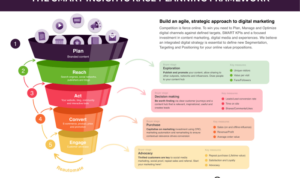E-commerce Growth Tips: In today’s digital age, maximizing your online presence is key to staying ahead in the business world. Dive into our guide to discover top strategies for achieving growth and success in the E-commerce realm.
Are you ready to take your online business to the next level? Let’s explore the world of E-commerce growth together.
Importance of E-commerce Growth

E-commerce growth is crucial for businesses in today’s digital age. With the increasing shift towards online shopping, businesses need to adapt and focus on expanding their E-commerce presence to stay competitive in the market.
Benefits of Focusing on E-commerce Growth
- Increased Reach: E-commerce allows businesses to reach a global audience, breaking geographical barriers and tapping into new markets.
- 24/7 Availability: Unlike physical stores, E-commerce platforms are open 24/7, providing customers with the convenience of shopping at any time.
- Cost-Effective: Running an E-commerce store can be more cost-effective than maintaining a brick-and-mortar store, saving on overhead expenses.
- Personalization: E-commerce platforms enable businesses to personalize the shopping experience for customers through targeted marketing and product recommendations.
Statistics on E-commerce Sales Growth
“E-commerce sales worldwide amounted to $4.28 trillion in 2020 and are projected to reach $5.4 trillion in 2022.”
These statistics highlight the rapid growth of E-commerce sales over the years, emphasizing the importance for businesses to invest in and prioritize their E-commerce strategies for sustainable growth and success.
Strategies for E-commerce Growth
To ensure successful growth in the E-commerce industry, it is crucial to implement effective strategies that focus on optimizing the website for better conversions, prioritizing mobile optimization, and learning from successful brands.
Optimizing the Website for Better Conversions
One key strategy for E-commerce growth is optimizing the website to increase conversions. This involves improving the user experience, simplifying the checkout process, and ensuring that product pages are engaging and informative.
- Utilize high-quality images and videos to showcase products.
- Implement clear call-to-action buttons to prompt users to make a purchase.
- Optimize website loading speed to reduce bounce rates.
- Utilize customer reviews and testimonials to build trust with potential buyers.
Importance of Mobile Optimization for E-commerce Growth
Mobile optimization is essential for E-commerce growth, as an increasing number of consumers are shopping on their smartphones and tablets. A mobile-friendly website ensures a seamless shopping experience and can significantly impact conversion rates.
- Implement responsive design to ensure the website is user-friendly on all devices.
- Optimize page speed for mobile devices to reduce loading times.
- Simplify the checkout process for mobile users to streamline the buying process.
- Utilize mobile-specific features such as geolocation services for targeted marketing.
Successful E-commerce Growth Strategies by Leading Brands
Several leading brands have implemented successful E-commerce growth strategies that have propelled their businesses to new heights. Learning from these examples can provide valuable insights for businesses looking to expand their online presence.
- Amazon’s personalized recommendations and fast delivery options have set a high standard for E-commerce customer experience.
- Sephora’s use of augmented reality technology to allow customers to try on makeup virtually has revolutionized the beauty industry.
- Walmart’s seamless integration of online and offline shopping experiences has attracted a wide customer base and boosted sales.
- Nike’s limited edition drops and exclusive collaborations have created a sense of urgency and exclusivity, driving sales and brand loyalty.
Utilizing Social Media for E-commerce Growth
In today’s digital age, social media has become a powerful tool for businesses to connect with their customers and drive sales. When it comes to E-commerce growth, leveraging social media platforms can significantly boost your online presence and increase sales.
Role of Social Media in E-commerce Growth
- Increased Brand Visibility: By actively engaging with your audience on social media, you can increase brand awareness and reach a larger audience.
- Direct Customer Interaction: Social media allows for direct communication with customers, providing a platform for feedback, inquiries, and building relationships.
- Targeted Advertising: Platforms like Facebook and Instagram offer targeted advertising options, allowing you to reach specific demographics and increase conversion rates.
- Driving Traffic to Your Website: By sharing engaging content and promotions on social media, you can direct traffic to your E-commerce site and boost sales.
Role of Influencers in E-commerce
Influencers play a crucial role in promoting E-commerce products to a wider audience. These individuals have a loyal following and can endorse your products authentically, increasing brand credibility and driving sales. Collaborating with influencers can help you tap into new markets and reach potential customers who may not have discovered your brand otherwise.
Tips for Creating Engaging Social Media Content
- Visual Appeal: Use high-quality images and videos to capture attention and showcase your products effectively.
- Consistent Branding: Maintain a consistent brand voice and aesthetic across all social media platforms to build brand recognition.
- Interactive Content: Encourage engagement through polls, contests, and interactive stories to keep your audience interested and involved.
- User-Generated Content: Share customer reviews, testimonials, and user-generated content to build trust and credibility with your audience.
Customer Retention Strategies for E-commerce Growth: E-commerce Growth Tips

Customer retention is crucial for the sustained growth of an E-commerce business. By focusing on building loyalty and encouraging repeat purchases, businesses can increase their revenue and establish a loyal customer base. Here are some effective strategies for customer retention in E-commerce:
The Power of Personalization
Personalizing the shopping experience for each customer can significantly increase their loyalty. By analyzing customer data and behavior, businesses can tailor recommendations, promotions, and communication to suit individual preferences.
Rewarding Loyalty
Implementing a loyalty program where customers earn points or rewards for their purchases can incentivize repeat business. Offering exclusive discounts, early access to sales, or special perks can keep customers coming back for more.
Excellent Customer Service
Providing exceptional customer service can set your E-commerce business apart from competitors. Responding promptly to inquiries, resolving issues efficiently, and showing genuine care for customers can foster long-term relationships.
Engaging Content and Community Building, E-commerce Growth Tips
Creating engaging content such as blogs, videos, or social media posts can help connect with customers on a deeper level. Building a sense of community around your brand can foster loyalty and encourage repeat purchases.
Automated Follow-ups and Recommendations
Utilizing automated email marketing campaigns to follow up with customers post-purchase can remind them of your brand and encourage future transactions. Recommending related products based on previous purchases can also drive repeat sales.





